The week's events ranged from "Gay Cabaret," a showcase that featured LGBT-related pieces from musicals, to "Coming Out Stories," a discussion of how students have handled coming out before and after college.
Fermin Liu Ku '15, who attended most of the week's events, said that PRIDE showed that the College is "really accepting" and "open-minded."
"My favorite event was the TransForm Runway show because it brought different groups from across campus together," he said.
PRIDE Week offers the "fractured" community the opportunity to come together in a "big way," Stewart Towle '12, who co-chaired last year's Pride Week, said. Since the LGBT community has no "explicitly queer" social space, PRIDE Week offers a unique time to promote awareness, educate and spread an inclusive message because "every little bit helps," according to Towle.
Approximately 40 people were involved in planning the week, in addition to separate clubs and organizations that sponsored PRIDE-related events, according to PRIDE co-chair Ashley Afrani-Sakyi '13.
Last year, the website Campus Pride named the College one of the most LGBT-friendly campuses in the nation, according to the website.
"It's really different from where I went to high school and middle school," Liu Ku said. "We're willing to talk about issues like sexuality and gender diversity."
The five-star rating from Campus Pride is a "great pat on the back, but we have a long way to go," according to women and gender studies professor Michael Bronski.
"If you put up a rainbow flag for seven days, what does it mean that it's not there for the 51 other weeks?" Bronski said. "Does it imply that the rest of campus isn't friendly?"
Bronski said that PRIDE, while "important," did not offer solutions for problems facing the LGBT community. Protecting LGBT students should be in the "forefront" of the administration's duties, since "all houses should be open to everyone," Bronski said.
"I hear from students that they are verbally and physically hassled in basements," Bronski said. "I don't know which ones they are, but I know it happens. What do we do about it?"
The creation of an LGBT affinity house would "highlight" that some of the College's social spaces are not safe for the entire student body, Bronski said. Such a house could become a "sanctuary" because some feel "endangered by Greek houses," according to Bronski.
"This is a school where you are implicitly told that in order to have a social life that you must join a Greek house," Bronski said. "Students pay a lot of money, and they should have access to everything the College offers."
Liu Ku said he plans on rushing next year because he considers the College's fraternities "mostly accepting," but he said that he knows others who feel differently.
Towle said he de-pledged his fraternity even though it was "a gay-friendly place as far as fraternities go." He said that the display of flags could alter people's perceptions of the Greek system but does not change each organization's internal practices.
"It is generally true that 10 years ago, if you were a gay man and wanted to live an open lifestyle, you couldn't be in a fraternity," Towle said. "Now, you can be a member of a fraternity but you may be tokenized."
Still, Towle said that he believes the College's minority communities are not protected at fraternities. "Being oppressed" is part of the "status quo," according to Towle.
"They're safe for white, heterosexual males who play sports, but even they're abused by their peers," Towle said. "Frats hanging rainbows flags on their front doors is more of a way of hiding that they discriminate behind closed doors."
Correction appended (May 23, 2014):
In the initial version of this article, Fermin Liu Ku '15 was identified in a way that did not reflect the content of the interview. The article has been revised.




